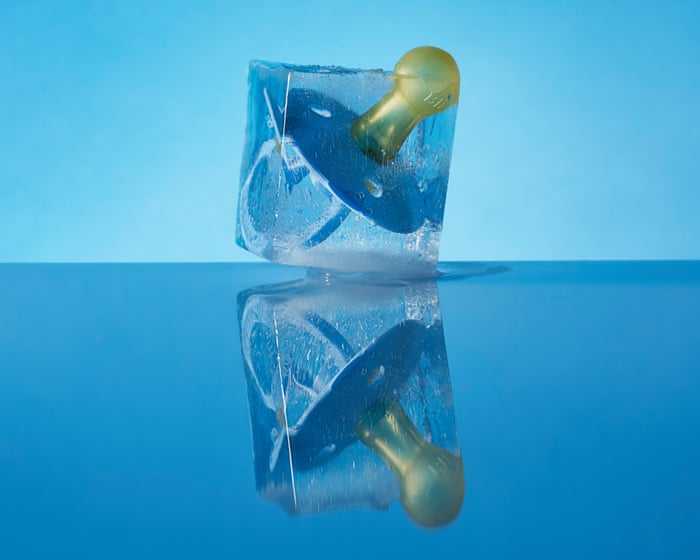When I first told my mother I was freezing my eggs, she joked, “So my grandchildren are going to be stored next to some Häagen-Dazs?” (Very funny, Mum.) I’m one of a growing number of women in the UK who have chosen to freeze their eggs to preserve their fertility, though, as I’ll discuss later, this has clear limitations.
According to the Human Fertilisation and Embryology Authority (HFEA), the UK’s fertility industry regulator, egg freezing cycles increased by 170% between 2019 and 2023. The technology has existed since the 1980s but became more accessible in the 2000s with vitrification, a flash-freezing technique. Now, celebrities like Florence Pugh and Michaela Coel openly share their experiences, and companies such as Meta, Spotify, and Goldman Sachs offer subsidies for the procedure to employees.
Despite growing awareness, oocyte cryopreservation—its medical name—can seem incredibly complex and intimidating. It certainly did for me. The fact that this part of the fertility industry faces criticism for commercialization and lack of transparency didn’t help. Here are the things I wish I’d known before starting the process.
Think of egg freezing as the first half of IVF
I was somewhat naive and didn’t realize that freezing my eggs was a step toward potential IVF. Similar to an IVF cycle, your ovaries are stimulated with hormones to produce extra follicles, each containing an egg. Once the follicles mature, the eggs are retrieved under sedation and frozen. When you’re ready to use them, they’re thawed, mixed with sperm, and transferred to your womb, just like in IVF. If you’re considering freezing your eggs, understand that you’re essentially preparing for IVF if natural conception isn’t possible.
A frozen egg doesn’t guarantee a child
“You have to be prepared that it may not be successful,” says Professor Melanie Davies, a senior consultant gynaecologist at University College London Hospitals’ reproductive medicine unit. Some eggs may not survive freezing, let alone thawing, fertilization, or embryo transfer. Dr. Zeynep Gurtin, a lecturer at UCL’s Institute for Women’s Health, advises treating egg freezing as an addition to your reproductive options: “It gives you another chance to try to become a parent using your own genetic material, but it doesn’t guarantee it will happen.”
Do your research to find the best clinic
You can search for UK clinics on the HFEA website and the Seen fertility advice site. Kayleigh Hartigan, CEO of Seen, suggests thinking about what matters most to you: a larger clinic that may feel less personal but sees many clients, or a smaller one with a more hands-on approach. “Have a call with the clinic to see if they’re the right fit for you.”
Since egg freezing is relatively new, success rates are hard to find. The best way to evaluate a clinic is by its live birth per embryo transfer rates, which you can compare to the national average on the HFEA website. Be wary of clinics that oversell, using language like guarantees or “you’ll regret not doing this”—Gurtin calls these “massive red flags.”
Schedule more time for it than you think
My egg freezing process took two months because my first cycle had to be canceled due to poor response to ovarian stimulation. Expect to spend about two weeks on a single cycle, including daily hormone injections for eight to eleven days.The process typically begins on the first or second day of your period, so your start date depends on your menstrual cycle. This is worth keeping in mind if you’re scheduling egg freezing around work or travel.
You’ll need to fit scans around your schedule
To track follicle development, you’ll have regular scans where an ultrasound probe is inserted into your vagina. I had to take time off work for my appointments, though many clinics offer early morning or evening slots. Choosing a clinic close to home or work is helpful—as filmmaker Matilda Hay, who documented others’ experiences before freezing her own eggs, notes, “You don’t want to be travelling for an hour.” Both Hay and I visited our clinics about four times over 11 days. You’ll also need at least one day off to recover from sedation after the egg retrieval procedure.
The injections are easier than expected
Most women, including me, are surprised by how quickly they get used to self-injecting. “Fertility injections are usually subcutaneous—they use short needles and go into the fatty tissue under the skin,” explains Wael Saab, a fertility consultant in London. You inject into your lower abdomen—it’s not fun, but it’s less painful than intramuscular shots like vaccines.
Don’t worry if you’re late for an injection
While injections should be given at the same time daily, being an hour or two off “shouldn’t make a huge difference,” says Saab. However, skipping a dose entirely could affect your cycle. If that happens, contact your clinic right away. You can carry your medication with you—Hay recalls one woman who took hers hiking in a thermos with an ice pack, and she used a similar method with a Chilly’s bottle.
Age matters more than you might think
The American Society for Reproductive Medicine states there’s “insufficient data” on the ideal age for egg freezing but confirms that live birth rates are higher for younger women. “Fertility doesn’t suddenly drop off at 35,” says Gurtin. “Many women conceive naturally in their late 30s and 40s, but egg freezing tends to be more successful with higher-quality eggs, which are primarily linked to younger age.”
You might need more than one round
I was too optimistic about needing just one round—at 36, I only retrieved six eggs, giving me relatively low odds of conception. Studies vary, but one suggests women aged 35-37 need 15 frozen eggs for a 70% chance of one live birth, while another estimates a 37-year-old would need 20 eggs for a 75% likelihood. However, it’s not just about numbers, according to Joyce Harper, a reproductive science professor at UCL.”Fertility depends on both the quantity and quality of your eggs, as well as the health of your womb,” she explains. “Even if you have plenty of eggs, pregnancy isn’t guaranteed.”
You don’t need to overdo supplements
Medical experts emphasize that a healthy lifestyle—eating a balanced diet, getting enough sleep, and exercising—is more crucial than pricey supplements. “The key is to avoid harming yourself with cigarettes, recreational drugs, alcohol, and vaping,” says Davies. If you do opt for supplements, Saab recommends vitamin D, folic acid, and coenzyme Q10: “I advise my patients to start taking these as soon as we begin treatment and continue throughout.” It’s also important to stop taking the pill before your egg freezing cycle. “You’ll respond better and produce more eggs if you’re not on hormonal contraception,” Davies notes. The same applies to those taking testosterone as part of gender-affirming hormone therapy.
Be aware of additional costs and medication
According to the HFEA, egg freezing and thawing typically cost between £7,000 and £8,000, but expenses can add up. Luzia Bruckamp, an Oxford PhD student who blogged about her experience, paid £6,700 for her first round after being quoted a lower price initially. She advises getting final quotes in writing. Many clinics provide initial estimates that may not cover blood tests or scans, and medication costs can range from £500 to £1,500, depending on the individual. It’s wise to budget for unexpected expenses.
You’ll need to ease up on intense workouts
As someone who loves the gym, I was disappointed to have to stop heavy weightlifting during my egg freezing cycle. Strenuous and high-impact exercises are discouraged to reduce the risk of ovarian torsion, a rare condition where an ovary twists and cuts off its blood supply. Overall, egg freezing is very safe, though some may experience mild side effects from injections or after the procedure, such as tiredness, bloating, or mood swings.
Egg retrieval isn’t as daunting as it sounds
On the day of egg collection, I was sedated, and my eggs were gently removed with a thin needle. “The procedure usually takes no more than 30 minutes,” says Harper. While there’s a small risk of infection or complications, as with any surgery, you can typically go home a few hours later. Over-the-counter pain relief can help with any discomfort, and you’ll find out how many eggs were collected that day.
Emotional reactions are common
It’s normal for this process to bring up deep thoughts about your relationships and future. “Many people feel emotions like, ‘I’m doing this alone because I haven’t found the right person,'” shares Michelle, who froze her eggs in London in 2022. Connecting with others going through the same experience can help—talk to fellow egg freezers and build a support network, even if it’s just a parent or a few understanding friends. Online groups like the Egg Freezing Support Community and Egg Freezing Support (UK) on Facebook are also great for finding support and connection.
Frequently Asked Questions
Of course Here is a list of helpful and natural FAQs about egg freezing inspired by the perspective of what I wish I had known
FAQs About Freezing Your Eggs
Beginner Definition Questions
1 What exactly is egg freezing
Egg freezing is a medical procedure where a womans eggs are retrieved from her ovaries frozen and stored for potential use in the future
2 Why would someone freeze their eggs at 36
At 36 egg quality and quantity begin to decline more rapidly Freezing eggs at this age preserves the current higherquality eggs for when youre ready to start a family giving you more options later
3 Is 36 too old to freeze eggs
No 36 is a very common age to do it While the ideal time is often in your late 20s or early 30s freezing at 36 can still be very effective at preserving your fertility
Process Experience Questions
4 What does the process actually involve
It involves about 12 weeks of daily hormone injections to stimulate your ovaries followed by a minor surgical procedure to retrieve the eggs The eggs are then frozen immediately
5 How long does the entire process take
From the start of injections to the egg retrieval procedure it typically takes about 1014 days
6 Is the process painful
The injections are similar to a quick pinch You might feel bloated and uncomfortable as your ovaries swell The retrieval itself is painless because youre sedated and you may have some cramping afterward
Cost Logistics Questions
7 How much does it cost
The cost can vary widely but often ranges from 10000 to 15000 for one cycle including medications and the first year of storage Storage fees are an additional annual cost
8 Does insurance cover egg freezing
Its rare but some insurance plans may cover parts of the process You should always check with your specific provider as coverage is expanding
9 How many eggs should I aim to freeze
Theres no magic number but a common goal is to freeze 1520 mature eggs to have a good chance for one or two children in the future Your doctor will give you a personalized target based on your test



